Unit 4 I used to be afraid of the dark.Section B Reading 课件2023-2024学年人教版九年级英语全册(43张PPT)
文档属性
| 名称 | Unit 4 I used to be afraid of the dark.Section B Reading 课件2023-2024学年人教版九年级英语全册(43张PPT) |

|
|
| 格式 | pptx | ||
| 文件大小 | 14.5MB | ||
| 资源类型 | 教案 | ||
| 版本资源 | 人教新目标(Go for it)版 | ||
| 科目 | 英语 | ||
| 更新时间 | 2024-01-13 00:00:00 | ||
图片预览


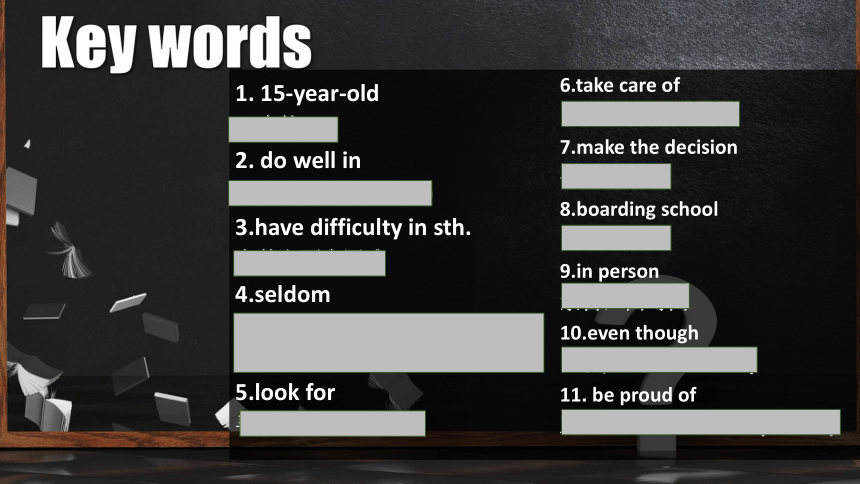

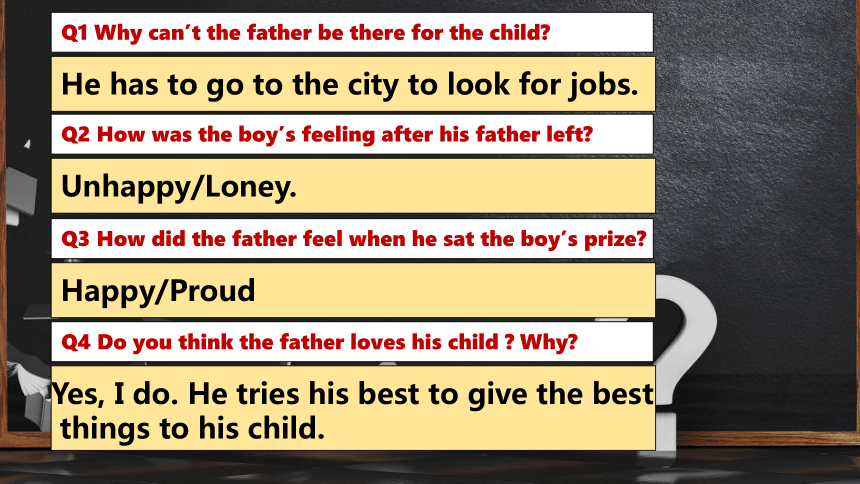


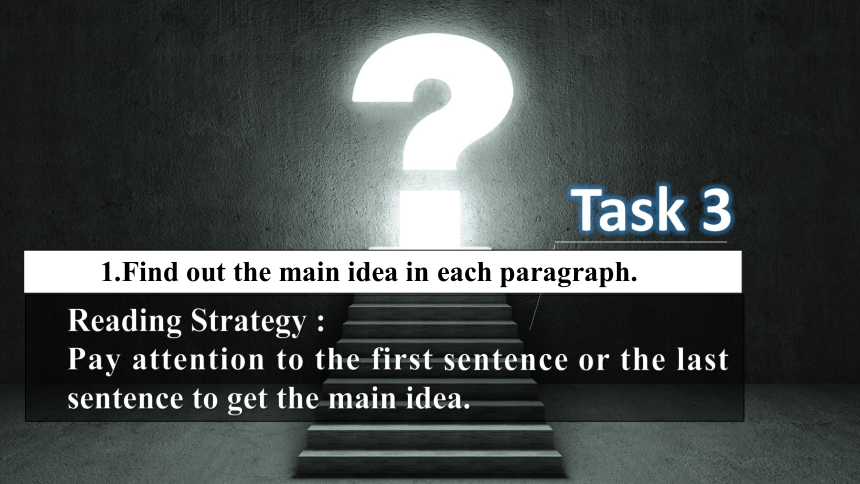
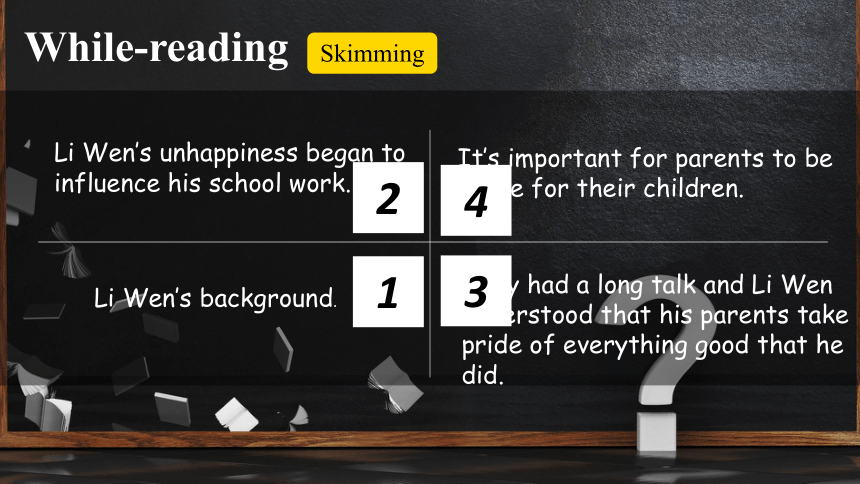


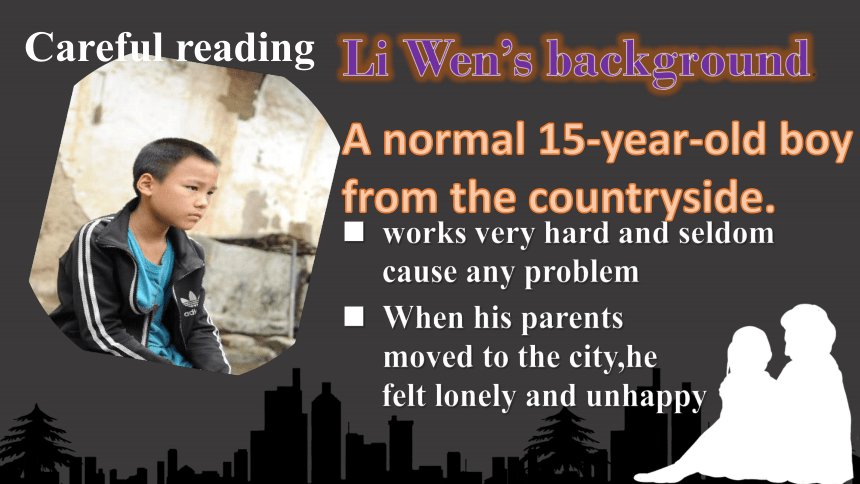
文档简介
(共43张PPT)
He Studies Harder Than He Used to
Unit 4 I used to be afraid of the dark
Task 1
Match the words or phrases with correct meanings.
Key words
1. 15-year-old
15岁的
2. do well in
擅长于(=be good at)
3.have difficulty in sth.
在某方面有困难
4.seldom
很少(有否定意义,位于实义动词之前,be动词/情态v.之后)
5.look for
寻找(=search for)
6.take care of
照顾 (=look after)
7.make the decision
做决定
8.boarding school
寄宿学校
9.in person
亲自,面对面
10.even though
即使, 虽然(=even if)
11. be proud of
对...感到自豪(=take pride in)
Task 2
Watch a viedo and answer the questions.
Q1 Why can’t the father be there for the child
He has to go to the city to look for jobs.
Q2 How was the boy’s feeling after his father left
Unhappy/Loney.
Q3 How did the father feel when he sat the boy’s prize
Happy/Proud
Q4 Do you think the father loves his child Why
Yes, I do. He tries his best to give the best
things to his child.
How do they feel as stay-at-home children
What problems do you think these children might have
Let’s discuss.
They miss
their parents.
They feel
unhappy.
They feel
lonely.
They hate
studying
They are often
late for school.
They often fight.
Task 3
1.Find out the main idea in each paragraph.
Reading Strategy :
Pay attention to the first sentence or the last sentence to get the main idea.
While-reading
Skimming
Li Wen’s background.
Li Wen’s unhappiness began to influence his school work.
They had a long talk and Li Wen understood that his parents take pride of everything good that he did.
It’s important for parents to be there for their children.
1
2
4
3
Task 4
Read Para.1 and choose “T” for true, “F” for false.
Careful reading
( ) 1. Li Wen used to have difficulties in school.
( ) 2. His parents left him behind and he felt very lonely and unhappy.
( ) 3. He didn’t like his grandparents.
( ) 4. He works very hard and does well in school when his grandparents came to look after him.
( ) 5. He missed his parents so much and wanted to live with them.
T
T
F
F
T
Careful reading
Li Wen’s background.
A normal 15-year-old boy from the countryside.
works very hard and seldom cause any problem
When his parents moved to the city,he felt lonely and unhappy
Careful reading
Read Para.2 and choose the right answer.
1. Why did Li Wen become less interested in studying
A. He was a lazy boy.
B. He wanted to play outside.
C. He felt lonely and unhappy.
D. He didn’t like to study.
2. Which of the following was NOT Li Wen’s difficulties in school
A. He was absent from classes.
B. He failed his examinations.
C. He was shy.
D. He had no friends in school.
C
D
Careful reading
Read Para.2 and choose the right answer.
3. His parents took a _______ and a ________ to get to Li’s school.
A. 24-hour bus, 5-hour train
B. 24-hour train, 5-hour bus
C. 24-hour train, 15-hour bus
D. 24-hour bus, 15-hour train
B
Careful reading
What difficulties did LinWen have
was absent from classes
failed the examinations
became less
interested in studying
Li Wen 's unhappiness
began to influence his schoolwork.
Careful reading
Read the last two paragraphs and then fill in the blanks.
Past Now
He felt ______ and ________. He was ____________ now, because he knew his parents __________________.
He _______________ classes and _______ his examinations. He worked ___________ than he used to.
He was _____ and was not be able to ____________ quickly in school. He became _____________ and ______________________ in school.
lonely
unhappy
much happier
were proud of him
was absent from
failed
even harder
shy
make friends
more outgoing
made some good friends
Li Wen has really changed.
joined the school basketball team
made some good friends.
become active in many
other activities
works even works than he used to
become more outgoing
much happier
Task 5
Retell the story according to the mind-map.
background
a 15-year-old boy
does well in
works hard
now
when he was a little boy
seldom caused problems;
parents spent a lot of time with him
a few years ago
parents moved to city to look for jobs
lonely
unhappy
good
happy
before the talk
influence
less interested in schoolwork;
was absent from classes;
failed his examinations;
not able to make friends quickly
result
teacher worried about and called his parents;
parents came back
After the talk
has become more outgoing;
has made good friends;
has joined the school basketball
team;
has become active
much happier
work even harder
What can you learn from
the story of Li Wen
There should be more communication between parents and children.
It is important for parents to be there for their children.
Parents and children should understand each other.
Love is never absent.
Task 6
Read the passage again and underline the problems
that Li Wen used to have.
problems
He felt lonely and unhappy.
He felt lonely and unhappy.
He was absent from classes.
He was absent from classes.
He was shy and was not able to
make friends quickly.
He wanted to leave school.
Task 7
Task 7 2d Use clues from the passage to help you guess the meaning of the word.
problems
influence
absent
boarding school
in person
1. not present; missing from
2. have an effect on; change
3. a school that a student can stay in &he /she does not need to go home every day
4. face to face
Task 8
Complete the passage with the proper forms of the words and phrases in the box.
be proud of / take pride in make a decision/ decide
miss/ be absent from
change / influence look after / take care of
Li Wen is a 15-year-old boy. He works hard and does well in school. It is hard to believe that he used to have difficulties in school. When his parents moved to the city to work, they could not be at home to _____________________him. So he became less interested in studying and _____________________ classes. Then his parents _____________ to send him to a boarding school. He found life there difficult. One day he told his teacher he wanted to leave the school. His teacher advised his parents to talk with their son in person. This conversation ____________________ his life.
look after / take care of
missed / was absent from
make a decision/decided
changed / influenced
Language Points
1. be nervous about 对……感到紧张
about 为介词,后接名词、代词或动词的
-ing形式作宾语。
翻译:没什么可紧张的。
There is nothing to be nervous about.
Language Points
2. It is hard to believe that he used to have difficulties in school.
It is hard to believe that …是一个含有宾语从句的复合句。主句中it作形式主语,真正的主语是that引导的从句。
Language Points
3. When he was a little boy, he seldom caused any
problems, and his family spent a lot of time together.
seldom 作副词,意为“不常;很少”相当于hardly ever,其反义词为often(经常)通常置于实义动词之前,助动词、系动词或情态动词之后。
翻译:她很少独自外出。
She seldom goes out by herself.
Language Points
3. When he was a little boy, he seldom caused any
problems, and his family spent a lot of time together.
① seldom 具有否定意义,用于句首表示强调时,主谓
要部分倒装。
除非下雨,我很少打车去购物。
Seldom do I go shopping by taxi, unless it’s raining.
② seldom 用于反意疑问句时,附加问句不用否定词not。
他们很少迟到,对吗?
They seldom come late, do they
Language Points
4. ...until a conversation with his parents influenced
his way of thinking.
influence v. & n. 影响
(1) 作为动词,意为“影响;对……起作用”。
(2) 作为名词,意为“影响;作用”。
have an influence on sth. /sb. 对某事/某人有影响
Language Points
5. He was absent from classes and failed his examinations.
be absent from … 缺席……
例:好学生是不会逃课的。
A good student would not be absent from school.
拓展:absent 用作动词, 意为“缺席;不参加”。
例:他昨天没有出席会议。
He absented himself from the meeting yesterday.
Language Points
6. fail v. 不及格;失败;未能 (做到)
fail作为动词,意为“不及格;失败;未能 (做到)”。 (1)fail sth. 或fail in sth. 意为“做某事失败或不及格”。
(2)fail to do sth. 意为“未能做某事”。
Language Points
7. Finally, Li Wen’s parents made the decision to
send him to a boarding school.
Finally 用作副词,意为 “最后;终于”。
同义词组:in the end, at last
在句中作状语通常位于句首、句末或实义动词之前,be动词、助动词或情态动词之后。
翻译:他终于解出了那道数学题。
He worked out the math problem finally.
Language Points
advise 的常用句型:
① advise doing sth. 建议做某事
He advised leaving early.
② advise sb. to do sth. 建议某人做某事
例:医生建议我彻底休息一下。
The doctor advised me to take a complete rest.
注意:advise后不能直接跟不定式作宾语。
Language Points
advise 的常用句型:
③ advise sb. against doing sth. 劝告某人不要做某事
有时可与 advise sb. not to do sth.互换。
④ advise sb. of sth. 通知或告知某人有某情况
翻译:货物到达时请通知我们。
Please advise us of the arrival of the goods.
Language Points
9. “…, they are always thinking of me. They take pride
in everything good that I do.”
(1) always常用在一般现在时态里,表示经常的行为
习惯。
当与进行时连用,构成句型“be always doing sth.”
时,常表达说话人的某种情绪,如赞扬、不满、
责备等。
Language Points
9. “…, they are always thinking of me. They take pride
in everything good that I do.”
(2) take pride in 为……感到自豪/骄傲
= be proud of
后接让人引以为荣的对象,其中pride为抽象名词,意为 “自豪;骄傲”,in 为介词,后接名词、代词或动名词作宾语。
翻译:这个年轻的妈妈为她的儿子感到自豪。
The young mother took pride in her son.
= The young mother was proud of her son.
Language Points
proud 与pride 的异同
proud
pride
形容词,意为“自豪的;骄傲的”。
be proud of 以……自豪
be proud of doing sth. = be proud to do sth.
因做……而自豪
名词,意为“自豪;骄傲”。
take pride in 以……自豪
Exercises
一、单选
He won in the story competition and his parents were very________.
A. smart B. proud C. sorry D. upset
2. — Would you like some coffee
— No, thanks. I ______ drink coffee.
A. seldom B. often C. only D. always
3. — Fights in action movies have a bad ______ on teenagers
— I agree with you.
A. habit B. opinion C. lesson D. influence
B
A
D
Exercises
一、单选
Nowadays China has made great achievements in many fields. We really ________
our amazing China.
A. take pride in B. take care of
C. take an interest in D. take place
5. — Miss Wang, I’m sorry I’m late because I _____ to catch the early bus.
— It doesn’t matter. You’d better come to school earlier next time.
A. needed B. failed C. managed D. decided
A
B
Exercises
二、根据汉语完成句子
有时候他上课缺席并且考试不及格。
Sometimes he was _______ from classes and ________ his examinations.
校长对我们非常负责,他亲自为我们做一切事情。
The headmaster is so responsible that he does everything for us _____ ______.
“一带一路”产生了巨大的社会影响。
The Belt & Road Initiative has had a great _______ ___________.
钱学森是中国人民的骄傲。
Qian Xuesen is the _______ of the _________ people.
absent
failed
in person
social influence
pride
Chinese
Summary
He Studies Harder Than He Used to
Unit 4 I used to be afraid of the dark
Task 1
Match the words or phrases with correct meanings.
Key words
1. 15-year-old
15岁的
2. do well in
擅长于(=be good at)
3.have difficulty in sth.
在某方面有困难
4.seldom
很少(有否定意义,位于实义动词之前,be动词/情态v.之后)
5.look for
寻找(=search for)
6.take care of
照顾 (=look after)
7.make the decision
做决定
8.boarding school
寄宿学校
9.in person
亲自,面对面
10.even though
即使, 虽然(=even if)
11. be proud of
对...感到自豪(=take pride in)
Task 2
Watch a viedo and answer the questions.
Q1 Why can’t the father be there for the child
He has to go to the city to look for jobs.
Q2 How was the boy’s feeling after his father left
Unhappy/Loney.
Q3 How did the father feel when he sat the boy’s prize
Happy/Proud
Q4 Do you think the father loves his child Why
Yes, I do. He tries his best to give the best
things to his child.
How do they feel as stay-at-home children
What problems do you think these children might have
Let’s discuss.
They miss
their parents.
They feel
unhappy.
They feel
lonely.
They hate
studying
They are often
late for school.
They often fight.
Task 3
1.Find out the main idea in each paragraph.
Reading Strategy :
Pay attention to the first sentence or the last sentence to get the main idea.
While-reading
Skimming
Li Wen’s background.
Li Wen’s unhappiness began to influence his school work.
They had a long talk and Li Wen understood that his parents take pride of everything good that he did.
It’s important for parents to be there for their children.
1
2
4
3
Task 4
Read Para.1 and choose “T” for true, “F” for false.
Careful reading
( ) 1. Li Wen used to have difficulties in school.
( ) 2. His parents left him behind and he felt very lonely and unhappy.
( ) 3. He didn’t like his grandparents.
( ) 4. He works very hard and does well in school when his grandparents came to look after him.
( ) 5. He missed his parents so much and wanted to live with them.
T
T
F
F
T
Careful reading
Li Wen’s background.
A normal 15-year-old boy from the countryside.
works very hard and seldom cause any problem
When his parents moved to the city,he felt lonely and unhappy
Careful reading
Read Para.2 and choose the right answer.
1. Why did Li Wen become less interested in studying
A. He was a lazy boy.
B. He wanted to play outside.
C. He felt lonely and unhappy.
D. He didn’t like to study.
2. Which of the following was NOT Li Wen’s difficulties in school
A. He was absent from classes.
B. He failed his examinations.
C. He was shy.
D. He had no friends in school.
C
D
Careful reading
Read Para.2 and choose the right answer.
3. His parents took a _______ and a ________ to get to Li’s school.
A. 24-hour bus, 5-hour train
B. 24-hour train, 5-hour bus
C. 24-hour train, 15-hour bus
D. 24-hour bus, 15-hour train
B
Careful reading
What difficulties did LinWen have
was absent from classes
failed the examinations
became less
interested in studying
Li Wen 's unhappiness
began to influence his schoolwork.
Careful reading
Read the last two paragraphs and then fill in the blanks.
Past Now
He felt ______ and ________. He was ____________ now, because he knew his parents __________________.
He _______________ classes and _______ his examinations. He worked ___________ than he used to.
He was _____ and was not be able to ____________ quickly in school. He became _____________ and ______________________ in school.
lonely
unhappy
much happier
were proud of him
was absent from
failed
even harder
shy
make friends
more outgoing
made some good friends
Li Wen has really changed.
joined the school basketball team
made some good friends.
become active in many
other activities
works even works than he used to
become more outgoing
much happier
Task 5
Retell the story according to the mind-map.
background
a 15-year-old boy
does well in
works hard
now
when he was a little boy
seldom caused problems;
parents spent a lot of time with him
a few years ago
parents moved to city to look for jobs
lonely
unhappy
good
happy
before the talk
influence
less interested in schoolwork;
was absent from classes;
failed his examinations;
not able to make friends quickly
result
teacher worried about and called his parents;
parents came back
After the talk
has become more outgoing;
has made good friends;
has joined the school basketball
team;
has become active
much happier
work even harder
What can you learn from
the story of Li Wen
There should be more communication between parents and children.
It is important for parents to be there for their children.
Parents and children should understand each other.
Love is never absent.
Task 6
Read the passage again and underline the problems
that Li Wen used to have.
problems
He felt lonely and unhappy.
He felt lonely and unhappy.
He was absent from classes.
He was absent from classes.
He was shy and was not able to
make friends quickly.
He wanted to leave school.
Task 7
Task 7 2d Use clues from the passage to help you guess the meaning of the word.
problems
influence
absent
boarding school
in person
1. not present; missing from
2. have an effect on; change
3. a school that a student can stay in &he /she does not need to go home every day
4. face to face
Task 8
Complete the passage with the proper forms of the words and phrases in the box.
be proud of / take pride in make a decision/ decide
miss/ be absent from
change / influence look after / take care of
Li Wen is a 15-year-old boy. He works hard and does well in school. It is hard to believe that he used to have difficulties in school. When his parents moved to the city to work, they could not be at home to _____________________him. So he became less interested in studying and _____________________ classes. Then his parents _____________ to send him to a boarding school. He found life there difficult. One day he told his teacher he wanted to leave the school. His teacher advised his parents to talk with their son in person. This conversation ____________________ his life.
look after / take care of
missed / was absent from
make a decision/decided
changed / influenced
Language Points
1. be nervous about 对……感到紧张
about 为介词,后接名词、代词或动词的
-ing形式作宾语。
翻译:没什么可紧张的。
There is nothing to be nervous about.
Language Points
2. It is hard to believe that he used to have difficulties in school.
It is hard to believe that …是一个含有宾语从句的复合句。主句中it作形式主语,真正的主语是that引导的从句。
Language Points
3. When he was a little boy, he seldom caused any
problems, and his family spent a lot of time together.
seldom 作副词,意为“不常;很少”相当于hardly ever,其反义词为often(经常)通常置于实义动词之前,助动词、系动词或情态动词之后。
翻译:她很少独自外出。
She seldom goes out by herself.
Language Points
3. When he was a little boy, he seldom caused any
problems, and his family spent a lot of time together.
① seldom 具有否定意义,用于句首表示强调时,主谓
要部分倒装。
除非下雨,我很少打车去购物。
Seldom do I go shopping by taxi, unless it’s raining.
② seldom 用于反意疑问句时,附加问句不用否定词not。
他们很少迟到,对吗?
They seldom come late, do they
Language Points
4. ...until a conversation with his parents influenced
his way of thinking.
influence v. & n. 影响
(1) 作为动词,意为“影响;对……起作用”。
(2) 作为名词,意为“影响;作用”。
have an influence on sth. /sb. 对某事/某人有影响
Language Points
5. He was absent from classes and failed his examinations.
be absent from … 缺席……
例:好学生是不会逃课的。
A good student would not be absent from school.
拓展:absent 用作动词, 意为“缺席;不参加”。
例:他昨天没有出席会议。
He absented himself from the meeting yesterday.
Language Points
6. fail v. 不及格;失败;未能 (做到)
fail作为动词,意为“不及格;失败;未能 (做到)”。 (1)fail sth. 或fail in sth. 意为“做某事失败或不及格”。
(2)fail to do sth. 意为“未能做某事”。
Language Points
7. Finally, Li Wen’s parents made the decision to
send him to a boarding school.
Finally 用作副词,意为 “最后;终于”。
同义词组:in the end, at last
在句中作状语通常位于句首、句末或实义动词之前,be动词、助动词或情态动词之后。
翻译:他终于解出了那道数学题。
He worked out the math problem finally.
Language Points
advise 的常用句型:
① advise doing sth. 建议做某事
He advised leaving early.
② advise sb. to do sth. 建议某人做某事
例:医生建议我彻底休息一下。
The doctor advised me to take a complete rest.
注意:advise后不能直接跟不定式作宾语。
Language Points
advise 的常用句型:
③ advise sb. against doing sth. 劝告某人不要做某事
有时可与 advise sb. not to do sth.互换。
④ advise sb. of sth. 通知或告知某人有某情况
翻译:货物到达时请通知我们。
Please advise us of the arrival of the goods.
Language Points
9. “…, they are always thinking of me. They take pride
in everything good that I do.”
(1) always常用在一般现在时态里,表示经常的行为
习惯。
当与进行时连用,构成句型“be always doing sth.”
时,常表达说话人的某种情绪,如赞扬、不满、
责备等。
Language Points
9. “…, they are always thinking of me. They take pride
in everything good that I do.”
(2) take pride in 为……感到自豪/骄傲
= be proud of
后接让人引以为荣的对象,其中pride为抽象名词,意为 “自豪;骄傲”,in 为介词,后接名词、代词或动名词作宾语。
翻译:这个年轻的妈妈为她的儿子感到自豪。
The young mother took pride in her son.
= The young mother was proud of her son.
Language Points
proud 与pride 的异同
proud
pride
形容词,意为“自豪的;骄傲的”。
be proud of 以……自豪
be proud of doing sth. = be proud to do sth.
因做……而自豪
名词,意为“自豪;骄傲”。
take pride in 以……自豪
Exercises
一、单选
He won in the story competition and his parents were very________.
A. smart B. proud C. sorry D. upset
2. — Would you like some coffee
— No, thanks. I ______ drink coffee.
A. seldom B. often C. only D. always
3. — Fights in action movies have a bad ______ on teenagers
— I agree with you.
A. habit B. opinion C. lesson D. influence
B
A
D
Exercises
一、单选
Nowadays China has made great achievements in many fields. We really ________
our amazing China.
A. take pride in B. take care of
C. take an interest in D. take place
5. — Miss Wang, I’m sorry I’m late because I _____ to catch the early bus.
— It doesn’t matter. You’d better come to school earlier next time.
A. needed B. failed C. managed D. decided
A
B
Exercises
二、根据汉语完成句子
有时候他上课缺席并且考试不及格。
Sometimes he was _______ from classes and ________ his examinations.
校长对我们非常负责,他亲自为我们做一切事情。
The headmaster is so responsible that he does everything for us _____ ______.
“一带一路”产生了巨大的社会影响。
The Belt & Road Initiative has had a great _______ ___________.
钱学森是中国人民的骄傲。
Qian Xuesen is the _______ of the _________ people.
absent
failed
in person
social influence
pride
Chinese
Summary
同课章节目录
- Unit 1 How can we become good learners.
- Section A
- Section B
- Unit 2 I think that mooncakes are delicious!
- Section A
- Section B
- Unit 3 Could you please tell me where the restroom
- Section A
- Section B
- Unit 4 I used to be afraid of the dark.
- Section A
- Section B
- Unit 5 What are the shirts made of?
- Section A
- Section B
- Review of Units 1-5
- Unit 6 When was it invented?
- Section A
- Section B
- Unit 7 Teenagers should be allowed to choose their
- Section A
- Section B
- Unit 8 It must belong to Carla.
- Section A
- Section B
- Unit 9 I like music that I can dance to.
- Section A
- Section B
- Unit 10 You're supposed to shake hands.
- Section A
- Section B
- Review of Units 6-10
- Unit 11 Sad movies make me cry.
- Section A
- Section B
- Unit 12 Life is full of the unexpected
- Section A
- Section B
- Unit 13 We're trying to save the earth!
- Section A
- Section B
- Unit 14 I remember meeting all of you in Grade 7.
- Section A
- Section B
- Review of Units 11-14
